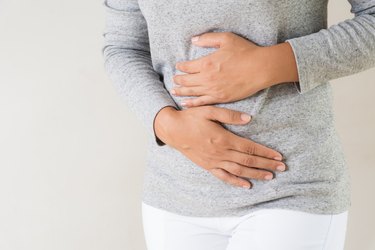
No one likes feeling bloated and constipated and, while often changing up your diet or drinking more water can help, sometimes a stronger solution becomes necessary. Yes, a laxative. But is it OK to eat afterward? It all boils down to what kind of laxative you take.
Why Take a Laxative?
Video of the Day
Laxatives can be useful, temporary medications for ending constipation, which can be caused by a myriad of factors. While some constipation is associated with a metabolic disease, such as diabetes, or with medications, such as antidepressants, sometimes it's simply caused by a diet lacking in fiber or by dehydration.
Video of the Day
There are five major types of laxatives, each of which works in a different way, explains the Mayo Clinic.
- Laxatives that add bulk. These laxatives, often in a powder form that needs to be mixed with
water, use fiber as a bulking agent. This increases both the water content and
the bulk of the stool, making it easier to pass. Popular products include psyllium
(Metamucil), methylcellulose (Citrucel), polycarbophil (FiberCon) and Benefiber (wheat dextrin). According to the Mayo Clinic, bulking agent laxatives can often produce
results in 12 hours but may take up to two to three days to work.
- Lubricant laxatives. These laxatives contain an
emollient, like mineral oil, that helps stool pass more quickly. These
laxatives are generally recommended only as a short-term constipation cure
because they can prevent important fat-soluble vitamins from being absorbed by
the body, according to the Tufts Medical Center.
- Stool softeners. Laxatives like docusate (Colace and
Surfak) add moisture to stool to allow it to pass more easily. But they may
take a few days to work, says the U.S. National Library of Medicine.
- Osmotic laxatives.
These laxatives with familiar brand names, like magnesium hydroxide (milk of magnesia) and polyethylene
glycol (Miralax), draw water into your intestine, also with the goal
of making the stool softer and easier to pass through.
- Stimulant laxatives.
Products like bisacodyl (Dulcolax) and the vegetable-based senna (Senokot)
work almost instantaneously by stimulating the lining of the intestine to
contract and push out stool.
More About Eating and Laxatives
How long should you wait after eating before taking a laxative? Because laxatives work in different ways, there are some variations in the answer to this question. According to Maria Vila, DO, a family medicine specialist in Morristown, New Jersey, it's important to give your body time — at least 30 minutes — to absorb the laxative before your next meal or snack.
While all laxatives work better when taken with water or juice — with some, one to two cups of liquid is a necessity — there are different guidelines regarding solid food. In fact, with some laxatives, the more important question is how long to wait after eating before taking it.
According to Mayo Clinic, some laxatives, like mineral oil, shouldn't be taken within two hours of eating because they can interfere with digestion and the absorption of key nutrients. Stimulant laxatives also need to be taken on an empty stomach because food can slow the results, according to the Mayo Clinic.
Another important point, though, is what you should eat and should not eat after taking a laxative. "Do not eat processed foods," says Niket Sonpal, MD, an internist and gastroenterologist, an adjunct assistant professor at Touro College of Osteopathic Medicine and a clinical instructor at Kingsbrook Jewish Medical Center in Brooklyn, New York. "Foods that have little or no fiber sit longer in your intestines."
Dr. Sonpal specifically recommends avoiding alcohol, dairy, red meat, sweets and fried foods, all of which can slow digestion and make constipation worse. Caffeine, too, should be avoided. "The caffeine in coffee and soft drinks can keep your body from holding onto water," says Dr. Sonpal. "And you need water to stay regular."
Healthy Lifestyle Changes
Defaulting to fiber-rich foods like fruits, vegetables and whole grains — paired with generous amounts of water — is the best way to get your digestion back in good working order and stay regular, eliminating the need for laxatives.
It's also important not to rely on laxatives, warns the Mayo Clinic. Taking them on a regular basis can actually create dependency.
- Mayo Clinic: "Laxative: Oral Route"
- Mayo Clinic News Network: "Q and A: "What’s the Best Way to Boost Your Fiber Intake?"
- Mayo Clinic: "Over-the-Counter Laxatives for Constipation: Use With Caution"
- Tufts Medical Center: “Lubricant Laxatives, Oral.”
- Niket Sonpal, MD, internist, gastroenterologist, adjunct assistant professor, Touro College of Osteopathic Medicine, clinical instructor, Kingsbrook Jewish Medical Center, Brooklyn, N.Y.
- Maria Nieves Avila, DO, family medicine specialist, Morristown, New Jersey
- U.S. National Library of Medicine: "Stool Softeners"
Is this an emergency? If you are experiencing serious medical symptoms, please see the National Library of Medicine’s list of signs you need emergency medical attention or call 911.